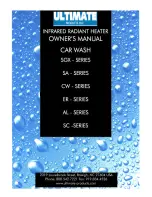
18
VENTING SYSTEM INSPECTION
At least once a year a visual inspection should be made of the venting
system. You should look for:
1. Obstructions which could cause improper venting. The
combustion and ventilation air fl ow must not be obstructed.
2. Damage or deterioration which could cause improper venting or
leakage of combustion products.
3. Rusted fl akes around top of water heater.
Be sure the vent piping is properly connected to prevent escape
of dangerous fl ue gasses which could cause deadly asphyxiation.
Obstructions and deteriorated vent systems may present serious
health risk or asphyxiation.
Chemical vapor corrosion of the fl ue and vent system may occur
if air for combustion contains certain chemical vapors. Spray can
propellants, cleaning solvents, refrigerator and air conditioner
refrigerants, swimming pool chemicals, calcium and sodium chloride,
waxes, bleach and process chemicals are typical compounds which
are potentially corrosive.
If after inspection of the vent system you found sooting or
deterioration, something is wrong. Call the local gas utility to
correct the problem and clean or replace the fl ue and venting before
resuming operation of the water heater.
BURNER INSPECTION
Flood damage to a water heater may not be readily visible or
immediately detectable. However, over a period of time a fl ooded
water heater will create dangerous conditions which can cause
DEATH, SERIOUS BODILY INJURY, OR PROPERTY DAMAGE.
Contact a qualifi ed installer or service agency to replace a fl ooded
water heater. Do not attempt to repair the unit! It must be replaced!
At least once a year a visual inspection should be made of the main
burner and pilot burner, see Figure 17.
PERIODIC MAINTENANCE
You should check for sooting. Soot is not normal and will impair
proper combustion.
Soot build-up indicates a problem that requires correction before
further use. Turn “OFF” gas to water heater and leave off until repairs
are made, because failure to correct the cause of the sooting can
result in a fi re causing death, serious injury, or property damage.
FIGURE 17.
BURNER CLEANING
In the event your burner needs cleaning, follow these instructions:
If inspection of the burner shows that cleaning is required, turn the gas
control knob clockwise (
) to the “OFF” position, depressing slightly.
NOTE: The knob cannot be turned from “PILOT” to “OFF” unless
knob is depressed slightly. DO NOT FORCE.
The burner needs to be removed for cleaning. Call a service agency
to remove and clean the burner and correct the problem that required
the burner to be cleaned.
HOUSEKEEPING
Vacuum around base of water heater for dust, dirt, and lint on a
regular basis.
AT LEAST ONCE EVERY SIX MONTHS A VISUAL
INSPECTION SHOULD BE MADE OF THE AIR
INTAKE SCREEN. CLEAN IF LINT ACCUMULATIONS
ARE NOTICED.
Summary of Contents for COMMERCIAL GAS WATER HEATERS
Page 3: ...3 GENERAL SAFETY...
Page 23: ...23 NOTES...







































